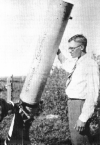 The boll weevil is a beetle that feeds on bolls, the seed-bearing capsules of cotton plants. Probably of Mexican or Central American origin, the boll weevil appeared in Texas about 1892, spread to most cotton-growing regions of the US, and eventually became responsible for the destruction of about 8% of the nation’s annual cotton crop. Eradication programs begun in 1978 have proven successful in many states. Why did the citizens of Enterprise, Alabama, erect a monument to the pest in 1919? Discuss
The boll weevil is a beetle that feeds on bolls, the seed-bearing capsules of cotton plants. Probably of Mexican or Central American origin, the boll weevil appeared in Texas about 1892, spread to most cotton-growing regions of the US, and eventually became responsible for the destruction of about 8% of the nation’s annual cotton crop. Eradication programs begun in 1978 have proven successful in many states. Why did the citizens of Enterprise, Alabama, erect a monument to the pest in 1919? Discuss
Source: The Free Dictionary
 Copernicus was a church canon, physician, and economist, but his most important work was in the field of astronomy. He developed the heliocentric theory of the universe that placed the Sun, not the Earth, at the center of our solar system and helped launch a scientific revolution. Though Copernicus conceived his revolutionary model of planetary motion by 1530, his treatise on the subject did not see print until he was on his deathbed in 1543. What heliocentric hypotheses preceded Copernicus’s?
Copernicus was a church canon, physician, and economist, but his most important work was in the field of astronomy. He developed the heliocentric theory of the universe that placed the Sun, not the Earth, at the center of our solar system and helped launch a scientific revolution. Though Copernicus conceived his revolutionary model of planetary motion by 1530, his treatise on the subject did not see print until he was on his deathbed in 1543. What heliocentric hypotheses preceded Copernicus’s?  On February 19, 1942, Japanese bomber and fighter planes conducted a devastating air raid on the town of
On February 19, 1942, Japanese bomber and fighter planes conducted a devastating air raid on the town of  The Battle of Gallipoli took place on the Turkish peninsula of Gallipoli during World War I. It was initiated by the Allies to open a Black Sea supply route to Russia and capture the Ottoman capital of Constantinople. The Allied navy arrived at Gallipoli in February 1915 but did not get sufficient land support for two months, giving the Turkish army ample time to reinforce its troops. After months of fighting, the Allied forces withdrew in January 1916. What had caused the Allied army’s delay?
The Battle of Gallipoli took place on the Turkish peninsula of Gallipoli during World War I. It was initiated by the Allies to open a Black Sea supply route to Russia and capture the Ottoman capital of Constantinople. The Allied navy arrived at Gallipoli in February 1915 but did not get sufficient land support for two months, giving the Turkish army ample time to reinforce its troops. After months of fighting, the Allied forces withdrew in January 1916. What had caused the Allied army’s delay?  The new rage is to say that the government is the cause of all our problems, and if only we had no government, we’d have no problems. I can tell you, that contradicts evidence, history, and common sense.
The new rage is to say that the government is the cause of all our problems, and if only we had no government, we’d have no problems. I can tell you, that contradicts evidence, history, and common sense.  Diamond Head—Le’ahi in Hawaiian—is a peak along the rim of an extinct volcano in southeast Oahu. Its English name was given by 19th-century British sailors who mistook calcite crystals embedded in the rock for diamonds. A prominent point in the Honolulu skyline, Diamond Head was designated a national natural landmark to protect its slopes from the commercial development along world-famous Waikiki Beach. Why do scientists think that Diamond Head was formed by a short-lived eruption?
Diamond Head—Le’ahi in Hawaiian—is a peak along the rim of an extinct volcano in southeast Oahu. Its English name was given by 19th-century British sailors who mistook calcite crystals embedded in the rock for diamonds. A prominent point in the Honolulu skyline, Diamond Head was designated a national natural landmark to protect its slopes from the commercial development along world-famous Waikiki Beach. Why do scientists think that Diamond Head was formed by a short-lived eruption?  Morrison is an African-American writer and former editor for Random House whose work helped bring African-American literature into the mainstream. In 1988, she won the Pulitzer Prize for Beloved, which is now included in the canon of American literature, and she was awarded the Nobel Prize in Literature in 1993. Her fiction is noted for its poetic language, lush detail, and emotional intensity. Why did she call Bill Clinton “our first Black president”?
Morrison is an African-American writer and former editor for Random House whose work helped bring African-American literature into the mainstream. In 1988, she won the Pulitzer Prize for Beloved, which is now included in the canon of American literature, and she was awarded the Nobel Prize in Literature in 1993. Her fiction is noted for its poetic language, lush detail, and emotional intensity. Why did she call Bill Clinton “our first Black president”?  Also known as Rashtriya Prajatantra Divas, this holiday commemorates the introduction of a democratic system of government in
Also known as Rashtriya Prajatantra Divas, this holiday commemorates the introduction of a democratic system of government in  Pluto was discovered by the astronomer Clyde Tombaugh at the Lowell Observatory in Arizona while he was searching for “Planet X,” a hypothetical planet that was believed to exist beyond Neptune. Pluto was long regarded as a planet, but following the discovery of other, larger Kuiper belt objects, astronomers recognized the need to reclassify Pluto. In 2006, the International Astronomical Union ended official recognition of Pluto as a planet. What is Pluto’s current classification?
Pluto was discovered by the astronomer Clyde Tombaugh at the Lowell Observatory in Arizona while he was searching for “Planet X,” a hypothetical planet that was believed to exist beyond Neptune. Pluto was long regarded as a planet, but following the discovery of other, larger Kuiper belt objects, astronomers recognized the need to reclassify Pluto. In 2006, the International Astronomical Union ended official recognition of Pluto as a planet. What is Pluto’s current classification?